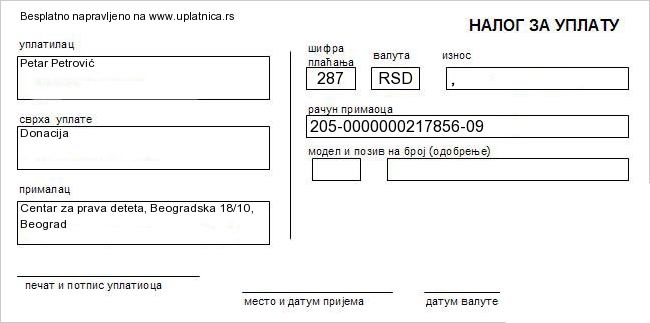
On 16 April 2021, the Ministry of Justice set up a Working Group for Drafting a Working Version of Amendments to the Law on Juvenile Criminal Offenders and Criminal Protection of Juveniles tasking it to draft a working text of the Law by 1 July 2021. In addition to representatives of judicial authorities, competent ministries and professional institutions, one of the Working Group members is CRC Director Jasmina Miković, representing the civil sector, who has actively participated in the Working Group meetings with specific proposals for harmonising certain provisions of the current law with international documents.
The existing Law was adopted more than fifteen years ago and despite certain legal and technical shortcomings, as well as some obviously insufficiently good solutions, it has not been amended in the meantime. The reason for working on the amendments to this Law is the state’s obligation under the revised Action Plan for Chapter 23 – Judiciary and Fundamental Rights, which envisages reviewing the types and systems of criminal sanctions for juveniles, special obligations, new diversion orders, etc. In addition, it is important to harmonise the provisions of the current law with the provisions of the Criminal Procedure Code, the Criminal Code, the Law on Organisation of Courts, the Law on Public Prosecutor’s Office, the Law on Police, the Law on Execution of Criminal Sanctions and the Law on Family, as well as other international documents, and in particular with Directive 2012/29/EU of the European Parliament and of the Council, establishing minimum standards on the rights, support and protection of victims of crime.
In addition to participating in the meetings of the Working Group, the CRC sent to the Ministry of Justice relevant written proposals for amendments to the Law in May 2021. Having in mind the provisions of the ratified Convention on the Rights of the Child, as well as the Guidelines of the Committee of Ministers of the Council of Europe on Child Friendly Justice, the CRC considers it necessary to harmonise criminal law terminology with international standards in the field of child’s rights and child-friendly justice, where child means a person under 18 years of age. It is, therefore, necessary to replace the term “juvenile” in every context by the term “child”.
Having in mind the provisions of Directive 2012/29/EU, the CRC proposed to clearly define in the Law the juvenile injured party’s right to a timely individual assessment aimed at identifying specific protection and support needs, security and safety measures and preventing secondary victimisation.
The CRC pointed to the necessity of ensuring a higher level of juveniles’ participation in the issuance of diversion orders to ensure their proper implementation. In addition, the CRC representative pointed out that one of the conditions for the implementation of diversion orders should be the juvenile’s consent. In addition, the CRC representative stressed the necessity of expanding the types of diversion orders and introducing a clearer definition of the restorative justice concept.
The CRC representative also highlighted the importance of ensuring that the hearing of juvenile injured parties was always conducted in a child-friendly environment, in a separate room, in the presence and with the assistance of an expert (psychologist, pedagogue or other professional specially trained to conduct forensic interviews) and without the presence of other parties in the procedure. It is also very important that the child does not wait for the hearing in an environment that is non-child-friendly or inappropriate, or walk through the court. The proposal is that this should be done in the premises outside the court building, in an environment specially designed for that purpose or in another appropriate space, using the mobile professional service for supporting child victims and witnesses of crimes, which could perform forensic interviews also in other spaces that are appropriate for an individual child.
Given that the current practice of multiple hearings of juvenile injured parties before a number of authorities leads to serious secondary traumatisation and victimisation of juvenile injured parties, the CRC strongly advocates for ensuring that juvenile injured parties are not heard more than once during procedure to avoid these adverse consequences. In order to prevent secondary victimisation and traumatisation, it is necessary to explicitly prohibit the defendant’s confrontation with the juvenile in case of all the crimes referred to in Article 150, as well as to ensure a higher degree of protection of juvenile witnesses to the crime.
Having in mind that preparing the child for a hearing in terms of complete psychological education of the child, providing support to the child during and immediately after the hearing, as well as providing continuous psychosocial, health and other necessary support, will prevent the secondary victimisation and traumatisation of the child, the CRC proposed the introduction of a new article of the Law clearly defining the obligation of providing these types of support, as well as the obligation of informing the child about the available types of support by the acting authorities.
We believe that a juvenile who has been a victim of the criminal offence referred to in Article 150 of this Law must have an attorney from the moment of his or her first hearing and first contact with the authorities, including preliminary criminal investigation. The provision of free legal aid and support is one of the basic child-friendly justice standards and in accordance with the Council of Europe Guidelines on Child-friendly Justice.
